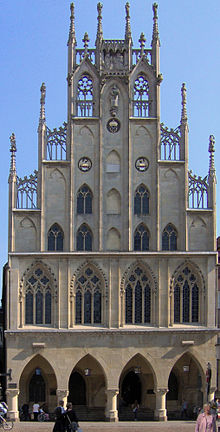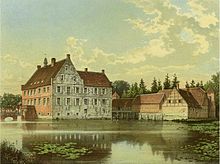Bernhard II of Droste zu Hülshoff
Bernhard II von Droste zu Hülshoff (* 1542 , † 1624 ) was the sixth and last mayor of the city of Münster from the Droste zu Hülshoff family and landowner of Hülshoff Castle . In his 14-year tenure as First Mayor, he confidently fought for the autonomy of the mixed-denominational city against the Prince-Bishops Ernst of Bavaria (1554-1612) and Ferdinand of Bavaria (1577-1650) as sovereigns.
Life
Origin and family
Bernhard II von Droste zu Hülshoff was probably born at Hülshoff Castle as the son of Heinrich I von Droste zu Hülshoff (1500–1570) and his wife Anna von Steveninck zu Möllenbeck as the sixth of ten children and belonged to the 13th generation of his family . His father was involved in the liberation of the city of Munster from the hands of the Anabaptists on June 24, 1535 , as a feudal man of Bishop Franz von Waldeck , with a brush and five horses ; he is depicted as a knight on a relief at Hülshoff Castle. A contemporary relative of Bernhard II was the clergyman Everwin Droste . Bernhard II was u. a. the great-great-great-great-great-grandfather on the paternal side of the poet Annette von Droste-Hülshoff .
Bernhard is said to have been a handsome man with blond hair and a reddish beard, and a man of keen understanding and an engaging but firm character, but of a quick temper in his youth. In 1574 Bernhard II married Catharina von Gend from the Wiesen family near Arnhem , who brought the Hohenwart estate into the marriage. She died childless in 1590. In 1591 he married again, with his cousin Richmod von Travelmann-Ebeling. She is said to have been a beautiful, amiable and rich lady, then 23 years old, and gave him ten children, including his successor Heinrich II von Droste-Hülshoff . Together with her sister-in-law, the canoness Benedicta von Droste zu Hülshoff, she founded the von Droste'sche Poor Foundation for the citizens of Roxel and died in 1613. At the age of 73, Bernhard II married for the third time, the childless twice widowed Anna von der Heiden called Rinsch. He was a passionate hunter and died at the old age of 82.
Act as councilor and mayor
After 350 years, Bernhard II was the last of at least twelve members of the Droste zu Hülshoff family who, according to the old hereditary tradition, held council offices in the city of Münster, before the hereditary dispute broke out in 1597 during his work proved disadvantageous (his son Heinrich II. von Droste-Hülshoff (1597–1666) and his successors preferred to accept punishments than to accept the election to these offices). As a predecessor in the office of mayor from his family are Johann III. voneckenbrock (1295–1349), Johann IV. Droste zu Hülshoff (1381–1446), Johann VI. Droste zu Hülshoff , Johann VII. Droste zu Hülshoff (1467–1539) and Everwin II. Von Droste zu Handorf († 1535) known, moreover as treasurer of the city Johann V. Droste zu Hülshoff . Bernhard II was councilor in 1582, 1585 and 1587, wine lord in 1600 and first mayor of the city of Münster for the long years 1605–1619 .
At the time of Bernhard, the city of Münster was at the center of political and denominational tensions: The Münsterland was under the influence of the Spanish-Dutch War . His tenure also extended into the beginning of the Thirty Years' War (1618–1648). Since 1588 the city council of Münster was involved with two representatives - besides the cathedral chapter and the nobility - in the prince-bishop's government, which was committed to the so-called Counter-Reformation . On the other hand, after the defeat of the Anabaptist Empire of Münster (1532–1536) (two generations later), numerous Anabaptists and other Protestants lived and died in the city . At that time, the estates were also largely Protestant. At that time there were still ten Protestant councilors on the Münster city council. The city's parishes, however, were obliged to carry out the decrees of the Council of Trent . Therefore, on the instructions of Bishop Johann IV von Hoya, as sovereign, they increasingly refused a Christian burial for those who had not yet committed to the Catholic Church before their death. In 1587, of all people , Everwin Droste , dean of St. Martini , who was ordained a priest in the same year and an uncle of Bernhard II, who was then councilor, refused to do so . However, the city council, through Bernhard's mediation, managed to arrange a funeral.
Against this background, the Münster estates (cathedral chapters, nobility, cities) also fought legal disputes among themselves. In 1606 Bernhard even appealed to the Imperial Court of Justice for alleged violation of urban freedoms by the bishop , whereupon the Emperor asked the city of Münster to respect the sovereign's full spiritual and secular jurisdiction . Nonetheless, Bernhard II managed to get the emperor to postpone his intervention until at least 1620 - with the help of a large citizens' meeting and the dispatch of a city delegation to the Reichshofrat in Prague. In a difficult time, Bernhard II led a city council that was also socially mixed, as the guilds had long since moved into it; At that time his policy was no longer just made up of the hereditary families. Bernhard II must have had great personal and political authority. Here, like his favorable political tradition of his family have helped that connected them with the former centers of power: On the one hand were his ancestors fief people the Prince Bishop as sovereign connected, on the other hand, as a former Drosten the mighty cathedral chapter , but most of all they had high reputation in the city as Erbmänner family that since then 350 years aldermen had asked, council members and mayors.
The following incident shows that exercising such offices in those uncertain times also required personal courage: Bernhard was a councilor in 1588 when the canons Bernhard von Oer and Johann von Westerholt (noble family) were knights of the Teutonic Order at the Church of St. Aegidii in Münster Melchior Droste to send murdered. On the basis of a court settlement (signed by Prince-Bishop Bernhard von Raesfeld in 1558), the city of Münster was entitled to imprison clergy who had committed criminal offenses until they were handed over to the bishop's jurisdiction, but only in "mild detention". Bernhard II penetrated the chapter house and, through his energetic demeanor, caused the two murderers to be extradited.
Act as a landowner
Thanks to the significant fortune of his second wife, Bernhard II was able to enlarge the Hülshoff estate through acquisitions, but he sold the family's old ancestral estate, Bettenbrock near Everswinkel . Hülshoff Castle , above whose entrance his alliance coat of arms Droste-Travelmann can still be seen, he had new walls fortified and the western so-called "old dog tower" built; On today's “new dog tower” you can still see his weather vane, also with the Droste-Travelmann coat of arms (thanks to the fortifications, people in Hülshoff defended themselves in the 18th century with 18 men and as many rifles always loaded). As a landowner, Bernhard II was a generally respected man and lived in peace with his neighbors, except for a feud with the Lords of Steveninck zu Brock. Otherwise his advice was sought as a mediator. He was also the head of a poor charity.
Descendants
Bernhard II bequeathed the Hülshoff estate with the secondary estates and the city courtyard in Münster on the Honekamp to his eldest son Heinrich II von Droste-Hülshoff , who - after studying and a cavalier tour a. a. through France - married to Clara Anna von Neheim (noble family) zu Niederwerries (see Oberwerries Castle ) and had twelve children with her. The Thirty Years' War, which was raging at the time, also led to tensions in the Heinrich II family: His younger son Heinrich (III), a soldier, attempted to murder his older brother Bernhard III. von Droste-Hülshoff , the heirs of Hülshoff, whom he survived. Heinrich II was also elected to the Münster city council in 1626, 1627 and 1628, but refused to accept it. He was a staunch Catholic, while at this time his cousins on Möllenbeck and their descendant Johann Eberhard von Droste zu Zützen had become Protestants. He donated a chapel at Hülshoff Castle for the first time and sold the town house to the Collegium Marianum of the Jesuit College. He passed the property on to his son Bernhard III. von Droste-Hülshoff (1634–1700). He was the great-great-great-grandfather of the poet Annette von Droste-Hülshoff . The Salvator bell of the church of St. Pantaleon in Roxel from 1693, which he donated, still bears his coat of arms today.
A daughter, Odilia, married her Protestant cousin Everwin von Droste zu Möllenbeck , a member of the productive society called "Der Labende".
Incidentally, Bernhard II was a great-uncle and godfather of the heir Rudolf von der Tinnen, the founder of the von der Tinnen Foundation in Münster, which still exists today.
literature
- Wilderich from Droste to Hülshoff : 900 years of Droste to Hülshoff . Verlag LPV Hortense von Gelmini, Horben 2018, ISBN 978-3-936509-16-8
- J. Holsenbürger: The gentlemen v. Eckenbrock (by Droste-Hülshoff) and their possessions. Münster iW 1869.
- Franz-Josef Jakobi (ed.): History of the city of Münster. 3rd edition Münster 1994.
- Hans-Georg Schmitz-Eckert: The Hochstift-Münster government from 1574–1803 (responsibility and organization). In: Westfälische Zeitschrift, Vol. 116, 1966.
Individual evidence
- ↑ Wilderich von Droste zu Hülshoff: 900 years Droste zu Hülshoff , Horben 2018, p. 83
- ↑ GERD DETHLEFS RUDOLPH VON DER TINNEN (1612-1702) Erbmann - Landlord - Mayor
| personal data | |
|---|---|
| SURNAME | Droste zu Hülshoff, Bernhard II. Von |
| BRIEF DESCRIPTION | Mayor of the city of Münster and landowner |
| DATE OF BIRTH | 1542 |
| DATE OF DEATH | 1624 |




